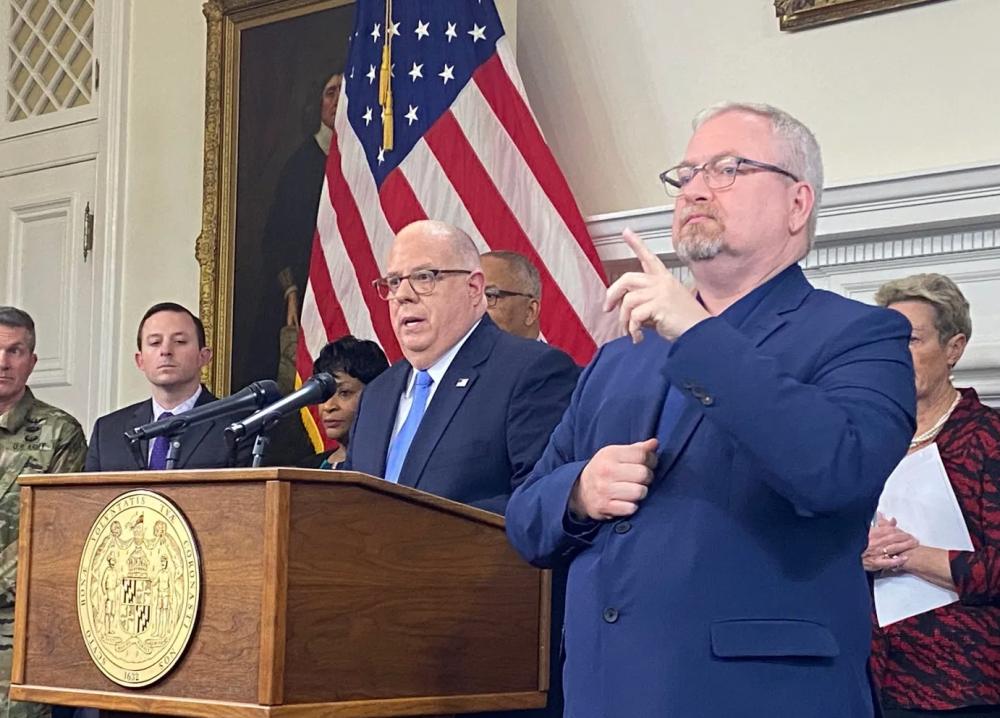State officials on Thursday announced a series of measures to mitigate the outbreak of COVID-19 in Maryland — including ordering all public schools closed for two weeks, beginning on Monday.
At a late afternoon State House news conference, Gov. Lawrence J. Hogan Jr. (R) joined with public health experts, educational leaders, the presiding officers of the General Assembly and public safety officials, to outline the state’s latest responses to what he described as “a new phase in the outbreak of this virus.”
Hogan said he would be turning day-to-day operations of state government over to Lt. Gov. Boyd K. Rutherford (R), “so I can focus my full attention on this crisis.”
Dr. Karen B. Salmon, Maryland’s superintendent of public schools, ordered public schools to be closed for two weeks, starting on Monday. School buildings and administrative offices would go through a deep cleaning during this period, Salmon said, and she is recommending to local school districts that lost instruction time be made up during the districts’ scheduled spring break, which in most cases occurs around Easter (April 12 this year).
Salmon said the state would release details in the days ahead of how it would provide childcare to the children of emergency service workers and how it would provide meals during the shutdown to the thousands of students who rely on free or reduced-price breakfasts and lunches during the school day.
The announcement that Maryland schools would be closing came just minutes after Ohio officials announced that their schools would be closing for three weeks.
Hogan said the recommendation to close the schools was Salmon’s, but that it was endorsed by public health officials and other political leaders.
“We’d rather be at the forefront,” the governor said.
Although the number of confirmed cases of COVID-19 in Maryland remains at a dozen as of Thursday’s news conference, the latest victim, announced late Wednesday night, is a Prince George’s County resident who was “the first case of community transmission,” Hogan said.
“The circumstances of this case indicate that we are entering a new phase of this crisis in our state, we should expect the number of cases to dramatically and rapidly rise,” he said. “Our primary focus is now turning from containment, to aggressively working to mitigate and limit the spread of the virus.”
To address the spreading outbreak, Hogan announced several measures:
• All events of more than 250 people throughout the state are canceled indefinitely;
• The National Guard has been activated, though Hogan said it was not immediately clear what their role throughout the crisis would be;
• The cruise ship terminal at the Port of Baltimore will be closed indefinitely, though two ships that are due back in the next few days will be allowed to dock;
• “Non-essential” state workers are being ordered to work from home, and Hogan said he is recommending that private sector employers do the same;
• Access to the State House and other government buildings will be severely limited;
• All expiration dates for state licenses and permits will be extended to 30 days after the declaration of emergency is lifted;
• Visits to state prisons will be banned.
“The actions that I have announced here today will be disruptive to your everyday lives,” Hogan said. “And they may sound extreme, and they may sound frightening, but they could be the difference in saving lives and helping keep people safe.”
Earlier in the day, the presiding officers of the General Assembly announced new procedures that they said would help protect lawmakers and the public from exposure to COVID-19 for the final 3 1/2 weeks of the legislative session, but it now appears likely that even more extreme measures will be enacted.
Senate President Bill Ferguson (D-Baltimore City) said that legislative leaders would be meeting immediately after Hogan’s news conference to determine what the legislature must do to “uphold its constitutional duties but doing it in a way that is safe and is protecting public health.”
The last time a General Assembly session was cut short, lawmakers have said, was during the Civil War.
By Josh Kurtz and Hannah Gaskill



Write a Letter to the Editor on this Article
We encourage readers to offer their point of view on this article by submitting the following form. Editing is sometimes necessary and is done at the discretion of the editorial staff.